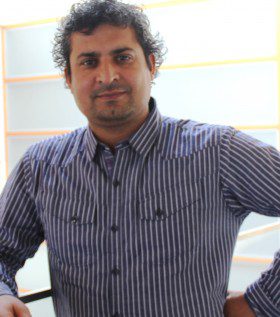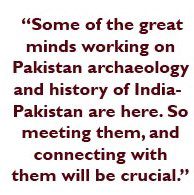 SAI is excited to welcome Dr. Muhammad Zahir as the inaugural Aman Fellow for the spring semester. The fellowship is meant for advanced professional degree holders in areas related to Pakistan, particularly areas of science and development. While at Harvard, Dr. Zahir will work under the mentorship of Professor Richard Meadow, Director of the Zooarchaeology Laboratory at the Harvard Peabody Museum, and Senior-Lecturer in Anthropology at Harvard.
SAI is excited to welcome Dr. Muhammad Zahir as the inaugural Aman Fellow for the spring semester. The fellowship is meant for advanced professional degree holders in areas related to Pakistan, particularly areas of science and development. While at Harvard, Dr. Zahir will work under the mentorship of Professor Richard Meadow, Director of the Zooarchaeology Laboratory at the Harvard Peabody Museum, and Senior-Lecturer in Anthropology at Harvard.
SAI talked to Dr. Zahir about his multidisciplinary background, what it’s like to be an archaeologist in Pakistan, and how he plans to use the resources at Harvard to further his research.
SAI: Congratulations on being chosen as SAI’s first Aman Fellow. How does it feel to be at Harvard?
Dr. Zahir: Thank you very much! It’s indeed a great honor and achievement for me. I’m sure it’s a game changer for me and my career. It’s a major milestone that I have. Thank you! It’s a wonderful opportunity.
SAI: Could you give us a general overview of your background and what you were doing before you came to Harvard?
MZ: I’m basically an archaeologist, but I had a bachelor’s degree in mathematics and physics. Then I was working on my research, and one day I was at a television program. An archaeologist was there, and this archaeologist was the most famous archaeologist that Pakistan has produced, so I left mathematics, and decided that I am going to become an archaeologist. I followed my instinct and left mathematics and physics. I went to Peshawar University and was declared as one of their best students from the last twenty years!
SAI: Is archaeology a popular degree program in Pakistan?
MZ: Well, in Pakistan, it’s gradually growing, you know, but it was not until 10 years ago, when there were only 2 full-fledged departments teaching archaeology. Now there are around 6 to 7 universities offering different courses in archaeology. It’s growing. After my master’s degree in archaeology, I went to be selected as one of the youngest lecturers ever selected in my province. Then I was teaching archaeology to undergrad students at Peshawar, and at the same time, I was continuing to do research. I directed excavations in different parts of Pakistan. Especially, my interest was in Peshawar city, which is considered one of the earliest living cities in the whole of South Asia.
SAI: And you continued to work on Pakistan while you were getting your PhD in England?
MZ: Yes, and in fact my PhD was accepted as submitted, not a single change was offered by my examiner, so it was something very prestigious for the whole of the university and the department. It’s a great honor to be able to do that. Nowadays, I am teaching at one of the universities in Pakistan, and at the same time I am doing research. So I have projects going on at the moment in 2 different areas in Pakistan, I am also the project director for Pakistan-Japan Archaeological Mission, it’s a collaborative effort. So I am basically a teacher, teaching archaeology, but I’m a field archaeologist, so I do a lot of fieldwork – I do surveys, I do excavations, fieldtrips. And at the same time I’m interested in the philosophical and theoretical issues of archaeology.

SAI: Now you’re in Cambridge, Massachusetts, what do you hope to do here?
MZ: As I said, it’s a great honor, and a dream coming true. I’m really excited. I have taken up another controversial issue. It’s the Aryan problem – it’s a major problem in archaeology and the history of India and Pakistan. What I’m trying to do is analyze genealogy – it’s a step-by-step analysis of the Aryans and how it is being promoted in Pakistan by archaeologists, by historians, by professionals, and how this is linked to the identities of the people. I hope to utilize the extensive literature and facilities in Cambridge to find out what is going on.
SAI: What kind of resources are here that you hope to take advantage of?
MZ: The first thing is the availability of printed material. In Pakistan, we don’t have extensive library facilities; we usually don’t get access to the online resources. And then, you don’t have this kind of environment in Cambridge, where you can discuss your ideas, you can take up your ideas. Some of the great minds working on Pakistan archaeology and history of India-Pakistan are here. So meeting them, and connecting with them will be crucial.
SAI: So even though you are an archaeologist, you hope to embrace and learn more about other subjects that will influence your work?
MZ: Yes, true – I am a multidisciplinary guy. I have worked with people in genetics, physical anthropology. Nowadays, I am working in Pakistan with faith leaders, Islamic faith leaders. For example, the episode that happened in Bamiyan, you know, so how that is linked with Islamic teaching. So this kind of thing – the destruction of heritage – is it promoted or not? So I work with different experts from the very beginning and I have a background in science myself.
SAI: While you are here, you will be working with Professor Richard Meadow. How do you intend to work with him?
MZ: We have worked together, almost 13 years ago. I was a student, pursuing my master’s degree in one of the leading universities in Pakistan. And he happened to come as part of a group doing research in Pakistan, and we worked together on one of the most important sites in Pakistan. In 2006, I also came here and delivered a lecture at the Peabody Museum. He has extensive knowledge, and he knows the area. I hope that he will be mentoring me, keeping me focused on something that I want to do.
SAI: Does your work cross borders, or do you work mostly on Pakistan?
MZ: No, the issues are almost the same within Pakistan or outside – the questioning of authority, the theoretical and philosophical paradigms are almost the same. We are traditionally brought up with a system where we do not question the authorities, and usually accept whatever is said by people. So I’m after this kind of culture – that we should get rid of it in order to move forward with bringing new ideas. And the subject I am researching now in this fellowship is common – common for both of these areas, India and Pakistan and almost all of South Asia. They are relevant to both, and Afghanistan.
SAI: Are you planning on being involved in any other SAI activities?
MZ: Yes, I think I will be delivering a seminar myself. And I will be going to the different seminars and connecting to people. My interests are across many disciplines, so this is a very good opportunity for me.
SAI: The Aman Fellowship is aimed for people who plan to go back to Pakistan after. What do you hope to bring back?
MZ: Well it depends! I’m not aware if there is any such fellowship from Pakistan and supporting people at Harvard. It’s quite unique in a sense that it’s from Pakistan, and a Pakistan organization is supporting a Pakistani to come to Harvard. So, I will take whatever I learn, back to my universities, back to my students. I will try to publish an article or two, and I am planning to develop my research into proper postdoctoral research. This is going to be an exciting period for me, and I will take back whatever I can.
